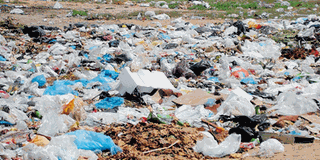Tanzania weighing on effects of banning plastic materials

What you need to know:
The minister for State responsible for Union Affairs and Environment, Mr January Makamba said on Friday that the authorities were still concerned over massive loss of jobs
Tanzania is still weighing on impact of the envisaged ban on the use polythene materials before effecting it.
The minister for State responsible for Union Affairs and Environment, Mr January Makamba said on Friday that the authorities were still concerned over massive loss of jobs.
“We don’t want to continue generating plastic wastes. At the same time we are concerned on the loss of jobs in factories producing polythene materials,” he said.
Speaking to reporters at the end of the regional meeting on environment, the minister stated that Tanzania was still keen on joining other East African Community (EAC) states in banning the use of plastic wastes, but was still cautious.
“Once you ban the use of plastics, some factories will have to be closed leading to loss of jobs,” he said, noting that relevant authorities are still weighing on the matter.
Rwanda and Kenya are among the EAC countries, which have banned the use of polythene materials used to make plastic bags and plastic bottles although not effectively done in the latter.
Early last year, the East African Legislative Assembly (Eala) passed the EAC Polythene Materials Control Bill 2017 aiming to prohibit manufacturing, sale, importation and use of the materials.
Although majority of MPs supported the legislation on human health and environmental grounds, others warned on the consequences on the manufacturing sector. Tanzania, which imports 70 per cent of its plastic bags, requested to be given more time to consult its private sector and other stakeholders before making its final decision.
However, the Zanzibar minister for Agriculture and Environment, Mr Hamad Rashid Mohamed said the Isles has taken deliberate measures to control use of plastic materials due to pollution of the ocean, impacting also on maritime transport.
“Once manufacturing of the plastics is banned, we should instead produce papers to create jobs,” he advised.
Plastic waste hazards in Tanzania include the electronic wastes currently generated at the rate of between 18,000 to 30,000 tonnes a year throughout the country.
Since 2006, the government has tried to ban the use of plastic bags below the width of 30 microns and extended it to bags below the width of 50 microns in 2015.
Speaking at the end of the ministerial meeting on Environment and Natural Resources, the EAC deputy secretary general, Mr Christophe Bazivamo said the region must address challenges posed by climate change.
“We need to quickly tap the opportunities now available in terms of finance and technology,” he said at the close of the meeting.




